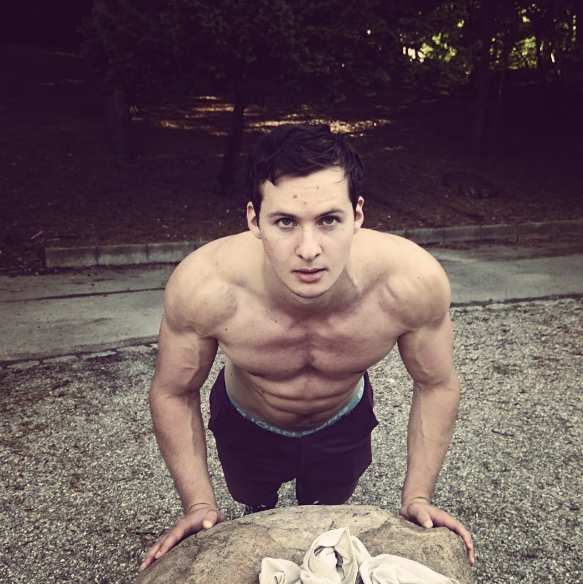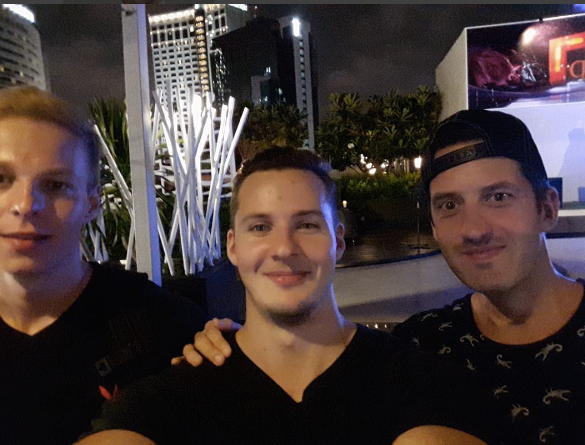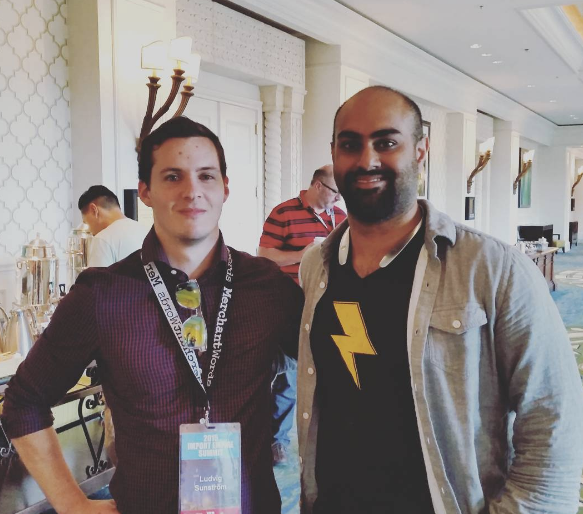20 questions with Ludvig Sunström (Exclusive Interview)
Ludvig Sunström used to be really good at video games.

After all, he had a near-photographic memory of the games he played. But then, at the age of 19, he decided to quit playing video games altogether. And it was the best decision of his life.
Now, Ludvig is in incredible shape, he has an admirable work ethic, he reads more than a book per week, and his hunger to learn is insatiable. He also has his own blog and podcast and has built an impressive following.
We tap into Ludvig's knowledge in today's exclusive 20 questions interview.
20 questions with Ludvig Sunström

1 - How would you describe yourself in one sentence?
Ludvig - I am an individual who is interested in learning about the world, improving myself and shaping my environment.
2 - You've suggested your website has more than 1 million views. What's your secret for attracting people to your content?
Ludvig - I know who I’m writing to—and I don’t try to write to anyone else.
3 - You've accomplished a lot at a young age. What is your proudest accomplishment?
Ludvig - This will sound funny, but it just may be quitting video games cold turkey at age 19. You gotta start somewhere, and if I hadn’t done that, I don’t think I would have done much else. Gaming is a great pacifier—and it’s only getting better...
4 - You mention it's important to "do away with many of the unnecessary things in life." What are a few examples of those unnecessary things?
Ludvig - Great question. Here are a few I can think of right now:
TV, video games, and other forms of sophisticated entertainment that ruins your concentration span and discipline at the expense of temporary enjoyment (may include social media, depending on how you’re using it and for what purpose).
Unhealthy foods.
Self-pity.
Hanging out on forums and being a spectator or a keyboard jockey.
Basically, be conscious about your inputs for information and stimulation. Don’t reward yourself when you haven’t earned it. Choose your obligations carefully. You only have so much attention and time in the day.

5 - Who inspires you?
Ludvig - Lots of people. Lee Kuan Yew, Napoleon, and Charlie Munger are among my main role models.
6 - What do you hope to accomplish by the time you're 30?
Ludvig - I would like to see the philosophy and lifestyle of Breaking out of Homeostasis spread into popular culture. And if that can’t be done—these things often take a long time and depend on critical mass as well as luck—I would like to see it adopted by more young ambitious people, whom it could be helpful to for the rest of their lives. Mainly people who are into personal development, entrepreneurship, and science or other intellectual efforts.
I would also like to put out two more big ideas I have in my head, but I’m not in a hurry to do so.
7 - What is a commonplace? Why is it important?
Ludvig - A commonplace is a personal organization system where you keep all useful information you come across. It’s important if you (1) want to find ways to scale your time and efforts in a systematic manner and (2) want to easily organize and find the information you come across. This is especially useful for people who are knowledge workers—who make a living via learning, creativity/synthesis, and working on more than one project.
8 - You've suggested your commonplace could be worth hundreds of thousands of dollars (to you). How are you able to associate that type of value to it?
Ludvig - By the usefulness of the information in it, given that it lets me do and learn things faster or better. For example, I have all my current projects planned out in it, I have checklists, templates, and best practices for different areas that help me work better and that I’m interested in... so it adds up over time. There’s no way I could keep all this stuff in my head.

9 - For those who aren't familiar with it, what is "25 Minuter?"
Ludvig - 25 Minuter is the (mostly Swedish) podcast I do together with my friend/mentor Mikael Syding, who is an award-winning former hedge fund manager. We try to keep each episode to 25 minutes, hence the name. Most of our content is centred around success, career, personal development, books we read, and big ideas we’re interested in.
10 - In the English episode, you mentioned one of your favorite books is Atlas Shrugged. Why is it one of your favorites?
Ludvig - Hm. It may be because Ayn Rand was so eloquent in pointing out various problems of socialist ideology, which I grew up with (and never liked, because I felt it impeded me a lot). Although I don’t necessarily subscribe to the Objectivist philosophy in many ways, I think it’s relevant given the present situation—with the rapid rise of stupid entertainment in popular culture, populist leaders rising to power by childish Robin Hood-esque logic, and the decrease of public accountability.
11 - One question you asked to Edmund Lowman was, "What is your superpower?" I'm going to steal your question, and ask you: What is your superpower?
Ludvig - I would say synthesis. I’m good at taking in a lot of information and seeing how it fits together and can be interpreted or used in diverse ways. I’m definitely more of a comprehensivist than I am a specialist.
12 - Why is it important that people break out of homeostasis?
Ludvig - Because otherwise you’ll probably stay the same—and not go through much personal development; be that physical, psychological, or intellectual.
The human brain (and body) evolved to stay in homeostasis (to maintain its equilibrium and minimize energy expenditure) and if you don’t understand the mechanisms for breaking out of that—when you need to or want to—then you’re going to be slow to adapt and make progress. You’ll get nowhere because your brain doesn’t listen to you.

13 - Who's the most interesting person you've had the pleasure of meeting?
Ludvig - I can’t pick one person objectively because what I’m interested in and the people I’m curious about change over time.
14 - What's your biggest pet peeve?
Ludvig - I try not to get bothered by things, but one thing that does bother me quite a lot is when people cough into their HANDS, especially people who should know better. The proper way is to cough into one’s arm, to avoid bacterial spread.
15 - You get to have dinner with three people, living or dead. Who are you eating with?
Ludvig - Napoleon, Lee Kuan Yew, and Benjamin Franklin. Those were some of the most comprehensively talented people in history, and I think they would have interesting and intelligent things to say about just about any topic. I would be curious to hear what they think an optimal political system would look like today.
16 - What's your favorite quote?
Ludvig - Perhaps, “great minds think alike." (Although it’s not necessarily true—disagreement and argument, among equals, tends to be more constructive.)

17 - You've suggested the school system is a failure. Why do you believe this?
Ludvig - That statement has to be interpreted in its intended context. The school system—which is roughly 200 years old—was great for its intended purposes, which was to train a person into factory work, a service position, or a middle managerial position. Those competencies were needed in the economy of most countries for industrialism to become as successful as it was (financially and technologically).
Today the situation is very different, and the school system does a poor job of helping people develop the competencies that are needed to become successful and prosperous in the current economy. I don’t think the school system—as we know it now—is particularly good at churning out entrepreneurs and intellectuals capable of interdisciplinary synthesis.
So the system is old and needs to be radically reformed. Have you ever wondered why most people who are “successful” (however you want to define that) tend to be self-learned?
18 - Where is one place that you've not yet traveled, that is on the top of your list to visit?
Ludvig - Hawaii. It’s got beautiful nature—from what I can see. I would like to go hiking there.

19 - What's your greatest fear?
Ludvig - To fail utterly, become disheartened by the failure, not try again, get seduced into self-pity, and then when that can’t go on any longer, replace it with a self-indulgent complacency.
Or to succeed (too suddenly), fail to find some new big, meaningful goal, get bored and lazy, and stop developing intellectually.
Both are standard human reactions I would like to avoid.
20 - What is one thing very few people know about you?
Ludvig - I have a near-photographic memory of video games, nearly all of them I played as a child. It doesn’t help me one bit though.
Despite his young age, Ludvig is one of the most intelligent and talented individuals I've had the pleasure of interviewing. My sincere thanks goes out to him for taking time out of his busy schedule to take on these 20 questions.
As always, thanks to all of you for taking the time to read.
Who would you like to see me throw 20 questions at? Drop me a comment below and I'll work on setting up the interview.
If you like what you read, be sure to follow my blog!

Previous "20 questions" interviews:
20 questions with @heiditravels
20 questions with @katecloud
20 questions with @manthostsakirid
20 questions with @blockchaingirl
20 questions with @piedpiper
20 questions with @stellabelle
20 questions with @budgetbucketlist
20 questions with @rogerkver
20 questions with @allasyummyfood
20 questions with @the-alien
20 questions with Janina Storace
20 questions with @mrs.steemit
20 questions with @andrarchy
20 questions with Scott Young
20 questions with Jesse Heiman
20 questions with @dragosroua
20 questions with Chelsea Dinsmore
20 questions with @sirwinchester
I always do my best to verify my interviews...
Check out the Tweet that Ludvig sent out to his followers.